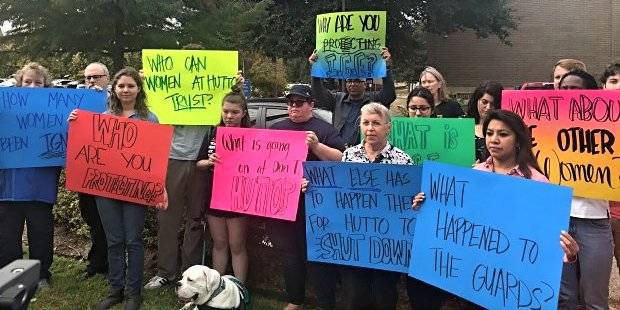
Migrants in Detention Are Suffering Widespread Abuse and Neglect
June 21, 2018As of Wednesday morning, the Trump administration seemed to be recalculating its cruel, widely criticized policy of separating migrant children from their parents at the border, with the president issuing an executive order that announced the administration would detain children and parents together from now on.
That does not mean that the crisis—which was manufactured by the administration from the beginning—is over, however. For one thing, thanks to a longstanding court ruling the government won't be able to detain families for longer than 20 days. For another, it doesn’t appear Donald Trump will be doing anything to address the broader problem of inhumane conditions in detention facilities where border crossers are housed.
The Department of Homeland Security’s own inspector general criticized these conditions in a December report that documented the improper housing of detainees in facilities meant for people with criminal records, strip searches that violated standards, abusive behavior by guards, and frequent threats of segregation from the rest of the detainees.
"Staff did not always tell detainees why they were being segregated, nor did they always communicate detainees’ rights in writing or provide appeal forms for those put in punitive lock-down or placed in segregation," the report found. "In multiple instances, detainees were disciplined, including being segregated or locked down in their cells, without adequate documentation in the detainee’s file to justify the disciplinary action."
More recently, the civil liberties observation organization Human Rights First released a review of conditions in Texas titled Ailing Justice: Texas, compiled after researchers toured eight immigrant detention facilities in the state, seven of which were run by private companies. Even as the Trump administration ramps up its war on immigration, with a renewed focus on criminalizing all border crossings, these problems may be getting worse.
"We're seeing a lot of unfortunate changes in the detention centers," Eleni Bakst, the lead author of the report, told me. "The inhumane conditions for adults are a result of an administrative use of detention as punitive, deterrent measure."
The scope of ICE detentions in Texas is staggering. At any time, Human RIghts First found, 11,000 people (mostly adults) are being detained in 22 facilities in the Lone Star State—well above the next two highest states, California and Georgia.
During Bakst's time volunteering at a family detention shelter—work unrelated to her report but done at the same time she was researching the facilities—she saw signs of regression among the children. Younger kids forgot their potty training and began sucking their thumbs again, while older children stayed attached to their parents as if they were toddlers. Even when children are with their families the trauma of being caged is enough to cause this sort of regression.
They might be considered the lucky ones. Children separated from their parents are placed in the custody of Health and Human Services' Office of Refugee Resettlement, the federal organization in charge of holding separated children under the Unaccompanied Alien Children Program.
"The United States taxpayer can no longer be responsible for being a surrogate parent for every would-be illegal immigrant who crosses our border," ORR told me in a statement. "Under our current immigration loopholes, if anyone under the age of 18 illegally enters the United States they will be placed into HHS custody and released into the interior of the United States, rather than returned home to their country of origin. This is open borders."
Children are placed in facilities as far away as New York and can suffer treatment that sounds horrific and abusive. Recent reports describe children being forcibly injected with antipsychotic drugs and becoming suicidal from the trauma of separation. There are at least three "tender age" shelters where babies and very young children are held.
What Human Rights First found out about conditions in the eight Texas DHS facilities it reviewed was similarly disturbing: inhumane treatment, long waits for medical attention, "unnecessary, lengthy, and prolonged detention—sometimes for well over one year."
Unsurprisingly, the report found that family separation is causing lasting damage to both the parents and family members who see their children taken away and the children who are being separated from their families.
Experts from the American Pediatrics Association have called the practice "child abuse" and say the detention of children that such treatment can have long-lasting damaging effects on child development and mental and emotional health.
The trauma for parents separated from their children is compounded by the conditions they face in the detention centers, where detainees are subject to dire treatment. One thing that stuck out for Bakst in the facilities she visited was the lack of proper laundry or new clothing. Some detainees reported that they were not provided new undergarments upon arrival and that when clothes were taken to be washed they were both improperly cleaned and not returned to the right people.
"In Laredo, every single woman said this caused vaginal infections and UTI," Bakst said, adding that she heard at other facilities about this practice leading to a number of rashes, infections, and communicable diseases.
One woman being held at the T. Don Hutto Residential Center, a women's detention center in Taylor, Texas, described to researchers being separated from her 21-month-year old son. It took two weeks before she was told where he was and whether he was OK.
"They put him in a car and he started to cry, but they closed the door and put me in another car," the woman told Bakst and her team. "I couldn’t go to him. It is so hard because he is so small, and he doesn’t understand. I wasn’t able to eat. I wasn’t able to sleep. My son’s deportation officer says he is crying all the time and screaming for me. I never imagined this would happen. I never imagined that I would come to this country and they would separate a mother from her baby."
That woman was recently released from DHS custody, said Bakst, who added she hopes the woman was reunited with her child.
Trump’s executive order may have been intended to address some of the objections many had to one of his most unpopular policies, but it’s hardly a panacea—on Wednesday, HHS said it was not planning on immediately reuniting families.
As of now, there are no plans to end the widespread detention of people crossing the southern border. That makes it more important than ever that the detention centers be clean, safe, and well managed.
"These facilities need major oversight," said Bakst.
Sign up for our newsletter to get the best of VICE delivered to your inbox daily.
Follow Eoin Higgins on Twitter.


